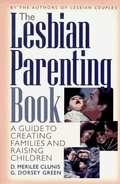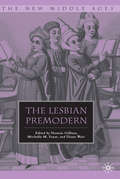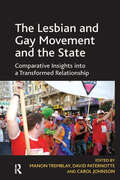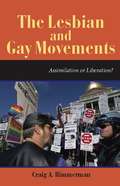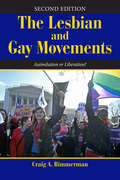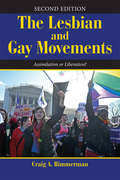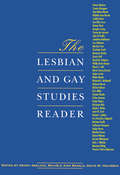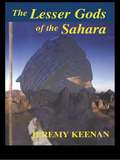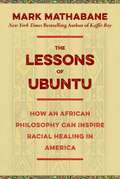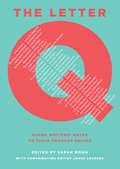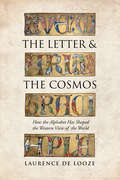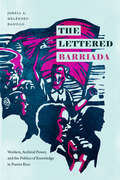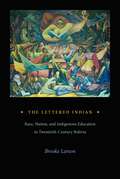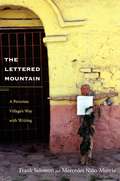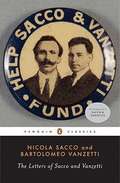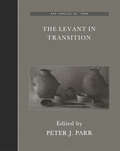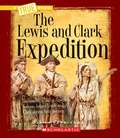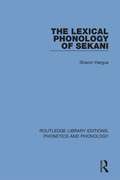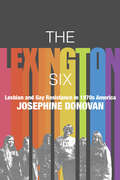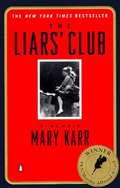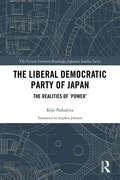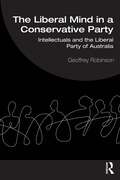- Table View
- List View
The Lesbian Parenting Book: A Guide to Creating Families and Raising Children
by D. Merilee Clunis G. Dorsey GreenMany topics covered, both in the areas of child raising, and raising children in non-traditional families. Wonderful support and education in this book. Written by psychologists who are the authors of "Lesbian Couples." (Also available on Bookshare.)
The Lesbian Premodern
by Diane Watt Noreen Giffney Michelle M. SauerKey scholars in the field of lesbian and sexuality studies take part in an innovative conversation that offers a radical new methodology for writing lesbian history and geography, drawing new conclusions on the important and often overlooked work being done on female same-sex desire and identity in relation to premodern cultures.
The Lesbian and Gay Movement and the State: Comparative Insights into a Transformed Relationship
by David PaternotteBy analyzing the relationship between lesbian and gay movements and the state, this ground-breaking book addresses two interconnected issues: to what extent is the lesbian and gay movement influenced by the state and, to a lesser extent, whether the lesbian and gay movement has somehow influenced the state, for instance by altering forms of sexual regulation. Given the diversity in national trajectories, this book covers fifteen countries. This enables the volume to shed light on different kinds of relationships between these groups and the state, as well as on the way they have evolved in recent decades. The Lesbian and Gay Movement and the State: Comparative Insights into a Transformed Relationship fills an important gap in the literature on lesbian and gay activism. However, this book also provides important and innovative insights into broader issues in international political science, public policy and comparative politics, as well as issues in social movement studies. These include the role of the state in constructing citizen identities, the heteronormative way in which many traditional citizen entitlements and benefits were constructed, state - civil society relations, judicial activism, the impact of federalism, and the increasing globalization of sexual identities.
The Lesbian and Gay Movements
by Craig A. RimmermanAn exploration of whether to embrace assimilationist or liberationist strategies in lesbian and gay movements in both contemporary and historical contexts, describing the sources of these conflicts, to what extent the conflicts have been resolved, and how they might be resolved in future.
The Lesbian and Gay Movements
by Craig A. RimmermanThroughout their relatively short history, lesbian and gay movements in the United States have endured searing conflicts over whether to embrace assimilationist or liberationist strategies. The Lesbian and Gay Movements explores this dilemma in both contemporary and historical contexts. Rimmerman tackles the challenging issue of what constitutes movement "effectiveness" and how "effective" the assimilationist and liberationist strategies have been in three contentious policy arenas: the military ban, same-sex marriage, and AIDS. Since the first edition in 2007, the landscape of lesbian and gay movements and rights has seen enormous changes. The thoroughly revised second edition includes updated discussion of LGBT movements' undertakings in, as well the Obama administration’s response to, HIV/AIDS policy, the fight to legalize same-sex marriage and overturn the Defense of Marriage Act, and the repeal of "Don’t Ask, Don’t Tell. "
The Lesbian and Gay Movements: Assimilation or Liberation?
by Craig A RimmermanThroughout their relatively short history, the lesbian and gay movements in the United States have endured searing conflicts over whether to embrace assimilationist or liberationist strategies. This new book explores this dilemma in both contemporary and historical contexts, describing the sources of these conflicts, to what extent the conflicts have been resolved, and how they might be resolved in future.<P> The text also tackles the challenging issue of what constitutes movement "effectiveness" and how "effective" the assimilationist and liberationist strategies have been in three contentious policy arenas: the military ban, same-sex marriage, and AIDS. Considerable attention is devoted to how policy elites--most notably Presidents Reagan, Bush, and Clinton; Congress; and the Supreme Court--have responded to the movements' grievances. The book examines the George W. Bush presidency with an eye to assessing how political opportunities have informed the broader lesbian and gay movements' strategies, and also details the response of the Christian Right to the movements' various assimilationist and liberationist strategies.
The Lesbian and Gay Movements: Assimilation or Liberation? (Dilemmas In American Politics Ser. #16)
by Craig A RimmermanThroughout their relatively short history, lesbian and gay movements in the United States have endured searing conflicts over whether to embrace assimilationist or liberationist strategies. The Lesbian and Gay Movements explores this dilemma in both contemporary and historical contexts, describing the sources of these conflicts, to what extent the conflicts have been resolved, and how they might be resolved in future. Rimmerman also tackles the challenging issue of what constitutes movement 'effectiveness' and how 'effective' the assimilationist and liberationist strategies have been in three contentious policy arenas: the military ban, same-sex marriage, and AIDS. Considerable attention is devoted to how policy elites (presidents, federal and state legislatures, courts) have responded to the movements' grievances. Since the publication of the first edition in 2007, there have been enormous changes in the landscape of lesbian and gay movements and rights. The thoroughly revised second edition includes updated discussion of LGBT movements' undertakings in, as well the Obama administration's response to, AIDS/HIV policy, the fight to legalize same-sex marriage and overturn the Defense of Marriage Act, and the repeal of 'Don't Ask, Don't Tell'.
The Lesbian and Gay Studies Reader
by Henry AbeloveBringing together forty-two groundbreaking essays--many of them already classics--The Lesbian and Gay Studies Reader provides a much-needed introduction to the contemporary state of lesbian/gay studies, extensively illustrating the range, scope, diversity, appeal, and power of the work currently being done in the field. Featuring essays by such prominent scholars as Judith Butler, John D'Emilio, Kobena Mercer, Adrienne Rich, Gayle Rubin, and Eve Kosofsky Sedgwick, The Lesbian and Gay Studies Reader explores a multitude of sexual, ethnic, racial, and socio-economic experiences. Ranging across disciplines including history, literature, critical theory, cultural studies, African American studies, ethnic studies, sociology, anthropology, psychology, classics, and philosophy, this anthology traces the inscription of sexual meanings in all forms of cultural expression. Representing the best and most significant English language work in the field, The Lesbian and Gay Studies Reader addresses topics such as butch-fem roles, the cultural construction of gender, lesbian separatism, feminist theory, AIDS, safe-sex education, colonialism, S/M, Oscar Wilde, Gertrude Stein, children's books, black nationalism, popular films, Susan Sontag, the closet, homophobia, Freud, Sappho, the media, the hijras of India, Robert Mapplethorpe, and the politics of representation. It also contains an extensive bibliographical essay which will provide readers with an invaluable guide to further reading.Contributors: Henry Abelove, Tomas Almaguer, Ana Maria Alonso, Michele Barale, Judith Butler, Sue-Ellen Case, Danae Clark, Douglas Crimp, Teresa de Lauretis, John D'Emilio, Jonathan Dollimore, Lee Edelman, Marilyn Frye, Charlotte Furth, Marjorie Garber, Stuart Hall, David Halperin, Phillip Brian Harper, Gloria T. Hull, Maria Teresa Koreck, Audre Lorde, Biddy Martin, Deborah E. McDowell, Kobena Mercer, Richard Meyer, D. A. Miller, Serena Nanda, Esther Newton, Cindy Patton, Adrienne Rich, Gayle Rubin, Joan W. Scott, Daniel L. Selden, Eve Kosofsky Sedgwick, Barbara Smith, Catharine R. Stimpson, Sasha Torres, Martha Vicinus, Simon Watney, Harriet Whitehead, John J. Winkler, Monique Wittig, and Yvonne Yarbro-Bejarano
The Lesbian in Literature: A Bibliography (3rd Edition)
by Barbara GrierA comprehensive listing of books by or about lesbians, prior to 1981. It includes some seven thousand titles, with annotations and a rating system to help the reader determine a book's significance.
The Lesser Gods of the Sahara: Social Change and Indigenous Rights
by Jeremy KeenanThe northern Tuareg (the Tuareg of Algeria) - the nomadic, blue-veiled warlords of the Central Sahara - were finally defeated militarily by the French at the battle of Tit in 1902. Some sixty years later, following Algerian independence in 1962, they were visited by a young English anthropologist, Jeremy Keenan. During the course of seven years, Keenan studied their way of life, the social, political and economic changes that had taken place in their society since traditional, pre-colonial times, and their resistance and adaptation to the modernising forces of the new Algerian state. In 1999, following eight years during which Algeria's Tuareg were effectively isolated from the outside world as a result of Algeria's political crisis, Keenan returned to visit them once again. Following a further four years of study, he has written a series of eight essays that capture the key changes that have occurred amongst Algeria's Tuareg in the forty years since independence.
The Lesser-known World of Mughal Emperor Jahangir
by Som Prakash VermaThis volume depicts the life and times of the Mughal emperor Jahangir in the light of his memoirs, Jahangirnama, popularly known as Tuzuk-i Jahangiri. With its fresh treatment of source material and a vivid account of historical events, the book tells the history of Jahangir’s India through his intimate and confessional memoirs incorporated in the genre of Mughal manuscript painting. The work is noteworthy for its historical portraits as well as Jahangir’s visual realism, his remarkable knowledge of natural history, and the perceptive and detailed descriptions of the world around him. Moving away from conventional historical writing, the book is a psychological study of an individual, his innate qualities, behavioural moves and instinctive affinities. Jahangir’s memoirs reveal deeper facets of him as a person as well as a poet, aesthete, connoisseur of painting and a keen observer of nature, both human and that of the natural world. The author also includes other contemporary literature of the period that narrate Jahangir’s life, such as Akbarnama, Ma’asir-i Jahangiri, Iqbalnama-i Jahangiri, Intikhab-i Jahangiri, Tatimma-i Waqi’at-i Jahangiri and Zakhirat-ul Khwanin, as well as Jesuits accounts and travelogues. He further analyses the influence of European Renaissance art on the history of Mughal paintings. A first of its kind, this book will greatly interest scholars and researchers of medieval history, Indian history, Mughal history, art history, popular culture and South Asian studies, as well as the general reader.
The Lessons of Ubuntu: How an African Philosophy Can Inspire Racial Healing in America
by Mark MathabaneA roadmap to healing America’s wounds, bridging the racial divide, and diminishing our anger.Mathabane touched the hearts of millions of people around the world with his powerful memoir, Kaffir Boy, about growing up under apartheid in South Africa and was praised by Oprah Winfrey and Bill Clinton. In his new book, The Lessons of Ubuntu: How an African Philosophy Can Inspire Racial Healing in America, Mathabane draws on his experiences with racism and racial healing in both Africa and America, where he has lived for the past thirty-seven years, to provide a timely and provocative approach to the search for solutions to America’s biggest and most intractable social problem: the divide between the races.In his new book, Mathabane tells what each of us can do to become agents for racial healing and justice by learning how to practice the ten principles of Ubuntu, an African philosophy based on the concept of our shared humanity. The book’s chapters on obstacles correlate to chapters on Ubuntu principles: The Teaching of Hatred vs. Empathy Racial Classification vs. Compromise Profiling vs. Learning Mutual Distrust vs. Nonviolence Black Bigotry vs. Change Dehumanization vs. Fogiveness The Church and White Supremacy vs. Restorative Justice Lack of Empathy vs. Love The Myth That Blacks and Whites Are Monolithic vs. Spirituality Self-Segregation: American Apartheid vs. HopeBy practicing Ubuntu in our daily lives, we can learn that hatred is not innate, that even racists can change, and that diversity is America’s greatest strength and the key to ensuring our future.Concerned by the violent protests on university campuses and city streets, and the killing of black men by the police, Mathabane challenges both blacks and whites to use the lessons of Ubuntu to overcome the stereotypes and mistaken beliefs that we have about each other so that we can connect as allies in the quest for racial justice.
The Letter Q: Queer Writers' Notes to Their Younger Selves
by James Lecesne Sarah MoonLife-saving letters from a glittering wishlist of top authors.If you received a letter from your older self, what do you think it would say? What do you wish it would say?That the boy you were crushing on in History turns out to be gay too, and that you become boyfriends in college? That the bully who is making your life miserable will one day become so insignificant that you won't remember his name until he shows up at your book signing?In this anthology, sixty-three award-winning authors such as Michael Cunningham, Amy Bloom, Jacqueline Woodson, Gregory Maguire, David Levithan, and Armistead Maupin make imaginative journeys into their pasts, telling their younger selves what they would have liked to know then about their lives as Lesbian, Gay, Bisexual, or Transgendered people. Through stories, in pictures, with bracing honesty, these are words of love and understanding, reasons to hold on for the better future ahead. They will tell you things about your favorite authors that you never knew before. And they will tell you about yourself.
The Letter and the Cosmos: How the Alphabet Has Shaped the Western View of the World
by Laurence N de LoozeFrom our first ABCs to the Book of Revelation's statement that Jesus is "the Alpha and Omega," we see the world through our letters. More than just a way of writing, the alphabet is a powerful concept that has shaped Western civilization and our daily lives. In The Letter and the Cosmos, Laurence de Looze probes that influence, showing how the alphabet has served as a lens through which we conceptualize the world and how the world, and sometimes the whole cosmos, has been perceived as a kind of alphabet itself. Beginning with the ancient Greeks, he traces the use of alphabetic letters and their significance from Plato to postmodernism, offering a fascinating tour through Western history.A sharp and entertaining examination of how languages, letterforms, orthography, and writing tools have reflected our hidden obsession with the alphabet, The Letter and the Cosmos is illustrated with copious examples of the visual and linguistic phenomena which de Looze describes. Read it, and you'll never look at the alphabet the same way again.
The Lettered Barriada: Workers, Archival Power, and the Politics of Knowledge in Puerto Rico
by Jorell A. Meléndez-BadilloIn The Lettered Barriada, Jorell A. Meléndez-Badillo tells the story of how a cluster of self-educated workers burst into Puerto Rico's world of letters and navigated the colonial polity that emerged out of the 1898 US occupation. They did so by asserting themselves as citizens, producers of their own historical narratives, and learned minds. Disregarded by most of Puerto Rico's intellectual elite, these workers engaged in dialogue with international peers and imagined themselves as part of a global community. They also entered the world of politics through the creation of the Socialist Party, which became an electoral force in the first half of the twentieth century. Meléndez-Badillo shows how these workers produced, negotiated, and deployed powerful discourses that eventually shaped Puerto Rico's national mythology. By following these ragtag intellectuals as they became politicians and statesmen, Meléndez-Badillo also demonstrates how they engaged in racial and gender silencing, epistemic violence, and historical erasures in the fringes of society. Ultimately, The Lettered Barriada is about the politics of knowledge production and the tensions between working-class intellectuals and the state.Duke University Press Scholars of Color First Book Award recipient
The Lettered Indian: Race, Nation, and Indigenous Education in Twentieth-Century Bolivia
by Brooke LarsonBringing into dialogue the fields of social history, Andean ethnography, and postcolonial theory, The Lettered Indian maps the moral dilemmas and political stakes involved in the protracted struggle over Indian literacy and schooling in the Bolivian Andes. Brooke Larson traces Bolivia’s major state efforts to educate its unruly Indigenous masses at key junctures in the twentieth century. While much scholarship has focused on “the Indian boarding school” and other Western schemes of racial assimilation, Larson interweaves state-centered and imperial episodes of Indigenous education reform with vivid ethnographies of Aymara peasant protagonists and their extraordinary pro-school initiatives. Exploring the field of vernacular literacy practices and peasant political activism, she examines the transformation of the rural “alphabet school” from an instrument of the civilizing state into a tool of Aymara cultural power, collective representation, and rebel activism. From the metaphorical threshold of the rural school, Larson rethinks the politics of race and indigeneity, nation and empire, in postcolonial Bolivia and beyond.
The Lettered Mountain: A Peruvian Village’s Way with Writing
by Mercedes Niño-Murcia Frank L. SalomonAndean peoples joined the world of alphabetic literacy nearly 500 years ago, yet the history of their literacy has remained hidden until now. In The Lettered Mountain, Frank Salomon and Mercedes Niño-Murcia expand notions of literacy and challenge stereotypes of Andean "orality" by analyzing the writings of mountain villagers from Inka times to the Internet era. Their historical ethnography is based on extensive research in the village of Tupicocha, in the central Peruvian province of Huarochirí. The region has a special place in the history of Latin American letters as the home of the unique early-seventeenth-century Quechua-language book explaining Peru's ancient gods and priesthoods. Granted access to Tupicocha's surprisingly rich internal archives, Salomon and Niño-Murcia found that legacy reflected in a distinctive version of lettered life developed prior to the arrival of state schools. In their detailed ethnography, writing emerges as a vital practice underlying specifically Andean sacred culture and self-governance. At the same time, the authors find that Andean relations with the nation-state have been disadvantaged by state writing standards developed in dialogue with European academies but not with the rural literate tradition.
The Letters of Sacco and Vanzetti
by Nicola Sacco Bartolomeo VanzettiCommemorating the eightieth anniversary of Sacco and Vanzetti's execution- with a new cover and new foreword Electrocuted in 1927 for the murder of two guards in Massachusetts, the Italian- American anarchists Nicola Sacco and Bartolomeo Vanzetti defied the verdict against them, maintaining their innocence to the end. Whether they were guilty continues to be the subject of debate today. First published in 1928, Sacco and Vanzetti's letters represent one of the great personal documents of the twentieth century: a volume of primary source material as famous for the splendor of its impassioned prose as for the brilliant light it sheds on the characters of the two dedicated anarchists who became the focus of worldwide attention. .
The Levant in Transition: No. 4 (The Palestine Exploration Fund Annual)
by P.J. ParrThe latter part of the 3rd millennium BC witnessed severe dislocations in the social, economic and political structures of the lands at the eastern end of the Mediterranean Sea - the Levant. In the south, in what is now Israel, the Palestinian Territories and Jordan, hitherto thriving urban centres disappeared, to be replaced for several centuries
The Lewis And Clark Expedition (True Books: Westward Expansion)
by John PerritanoComprehensive text about the Lewis and Clark expedition in the Louisiana territory in preparation for the Louisiana Purchase.
The Lexical Phonology of Sekani (Routledge Library Editions: Phonetics and Phonology #6)
by Sharon HargusFirst published in 1988. This title explores the phonology of Sekani, a northern Athabaskan language, within the framework of Lexical Phonology. After providing an overview of the language of Sekani and the theory of Lexical Phonology, the author goes on to explore various issues in the application of this theory. This title will be of interest to students of language and linguistics.
The Lexington Six: Lesbian and Gay Resistance in 1970s America
by Josephine DonovanOn September 23, 1970, a group of antiwar activists staged a robbery at a bank in Massachusetts, during which a police officer was killed. While the three men who participated in the robbery were soon apprehended, two women escaped and became fugitives on the FBI's Ten Most Wanted list, eventually landing in a lesbian collective in Lexington, Kentucky, during the summer of 1974. In pursuit, the FBI launched a massive dragnet. Five lesbian women and one gay man ended up in jail for refusing to cooperate with federal officials, whom they saw as invading their lives and community. Dubbed the Lexington Six, the group's resistance attracted national attention, inspiring a nationwide movement in other minority communities. Like the iconic Stonewall demonstrations, this gripping story of spirited defiance has special resonance in today's America. Drawing on transcripts of the judicial hearings, contemporaneous newspaper accounts, hundreds of pages of FBI files released to the author under the Freedom of Information Act, and interviews with many of the participants, Josephine Donovan reconstructs this fascinating, untold story. The Lexington Six is a vital addition to LGBTQ, feminist, and radical American history.
The Liars' Club: A Memoir
by Mary Karr"Astonishing. . . one of the most dazzling and moving memoirs to come along in years. " -Michiko Kakutani, The New York Times. "Mary Karr's God-awful childhood has a calamitous appeal. . . the choice in the book is between howling misery and howling laughter, and the reader veers toward laughter. Karr has survived to write a drop-dead reply to the question, 'Ma, what was it like when you were a little girl?'" -Time. "This book is so good I thought about sending it out for a back-up opinion. . . it's like finding Beethoven in Hoboken. To have a poet's precision of language and a poet's instinct into people applied to one of the roughest, ugliest places in America is an astonishing event. " -Molly Ivins, The Nation. "Elegiac and searching. . . her toughness of spirit, her poetry, her language, her very voice are the agents of rebirth on this difficult, hard-earned journey. " -New York Times Book Review. "Bold, blunt, and cinematic. . . nothing short of superb. " -Entertainment Weekly. "Overflows with sparkling wit and humor. . . Truth beats powerfully at the heart of this dazzling memoir. " -San Francisco Chronicle. "Karr lovingly retells her parents' best lies and drunken extravagances with an ear for bar-stool phraseology and a winking eye for image. The revelations continue to the final page, with a misleading carelessness as seductive as any world-class liar's. " -The New Yorker.
The Liberal Democratic Party of Japan: The Realities of ‘Power’ (Nissan Institute/Routledge Japanese Studies)
by Kōji NakakitaThis book provides a thorough analysis of the Liberal Democratic Party of Japan (LDP), from a variety of perspectives including its factions, party presidential elections, the distribution of posts, national elections, local organisations, the policy making process and partner organisations. Drawing on comprehensive and up-to-date data, as well as a large number of interviews, internal party documents and quantitative data, The Liberal Democratic Party of Japan explains the machinery of the Japanese government and ruling party, exploring how policies are made. In so doing, the chapters also analyse the strengths and weaknesses of today’s LDP through a comparison of Koizumi Juni’ichirō and Abe Shinzō, both having established long-lasting administrations through their strong leadership. Demonstrating how the LDP has changed significantly over recent years, particularly since the political reforms of 1994, this book will be extremely useful to students and scholars of Japanese and Asian politics.
The Liberal Mind in a Conservative Party: Intellectuals and the Liberal Party of Australia
by Geoffrey RobinsonRobinson analyses the peculiarly Australian intellectual tradition of liberal conservatism within the mainstream centre-right Liberal Party of Australia. Conservative intellectuals in Australia have forged a pragmatic, sceptical and utilitarian liberal conservatism focused on the tasks of government. It remains distant both from the romantic and organicist ideas of the populist right and the simplicities of libertarianism.Focusing on key figures within this tradition, Robinson tracks the progress of Australian liberal conservatism over the years through its origins in the work of David Hume to the thoughts of Peter Coleman, David Kemp and Andrew Norton before moving forward to George Brandis and Gregory Melleuish. The Liberal Party of Australia has appealed successfully to the conservative sentiments of voters in a liberal society. The Liberal Mind in a Conservative Party tells the story of seven intellectuals who helped make this possible. Peter Coleman drew on John Anderson, Georges Sorel and Michael Oakeshott to champion neoconservatism. He argues that this potent political ideology has shaped a distinct political identity, which rejects conservative traditionalism, and libertarian economics, while defending a pragmatic approach to capitalism.A fascinating read for students and scholars of Australian politics, this book will also be of great value to readers with an interest in international centre-right politics.
